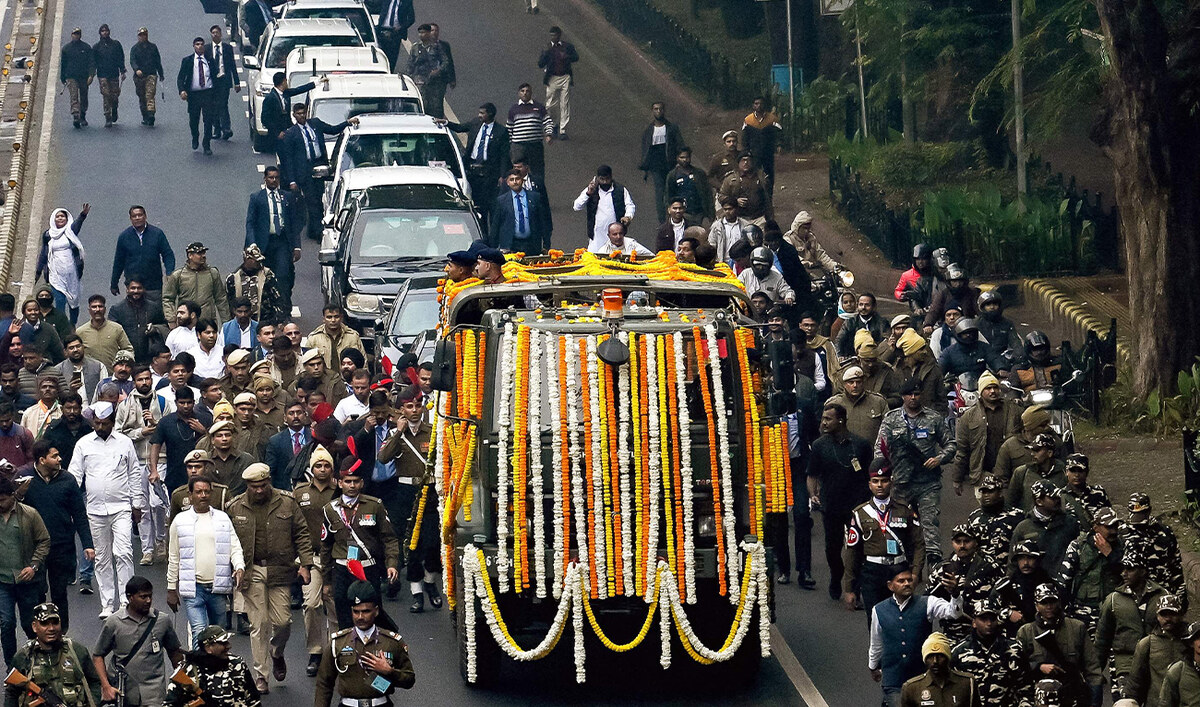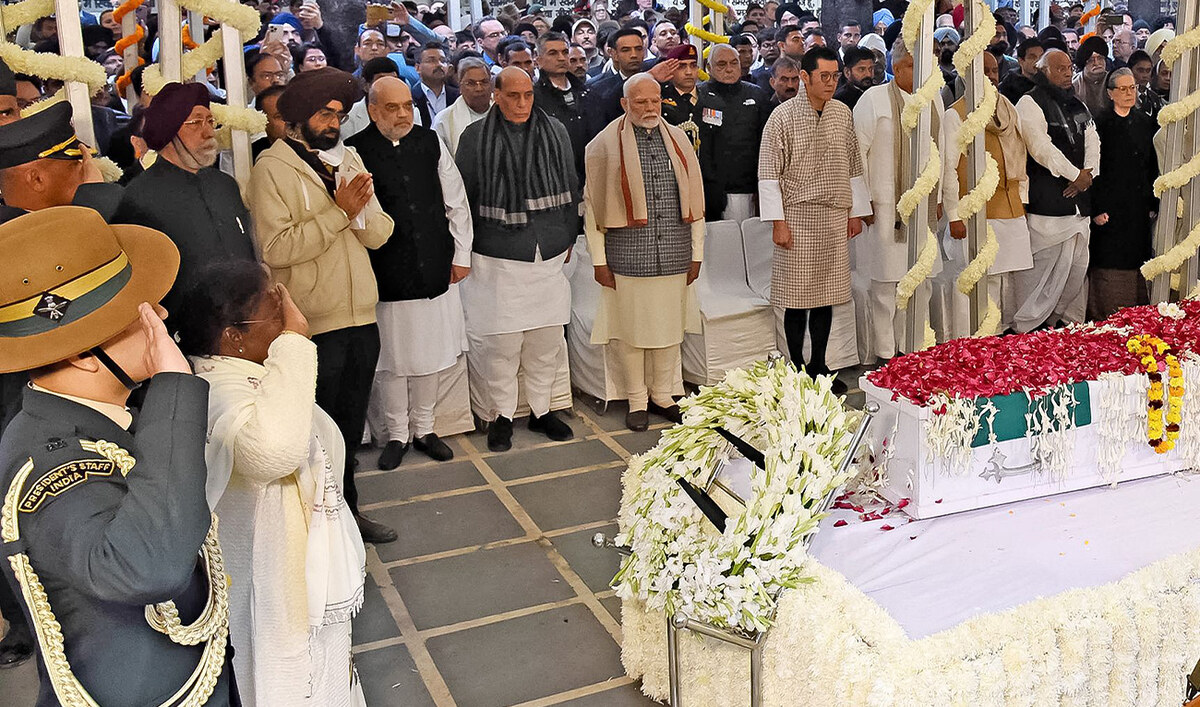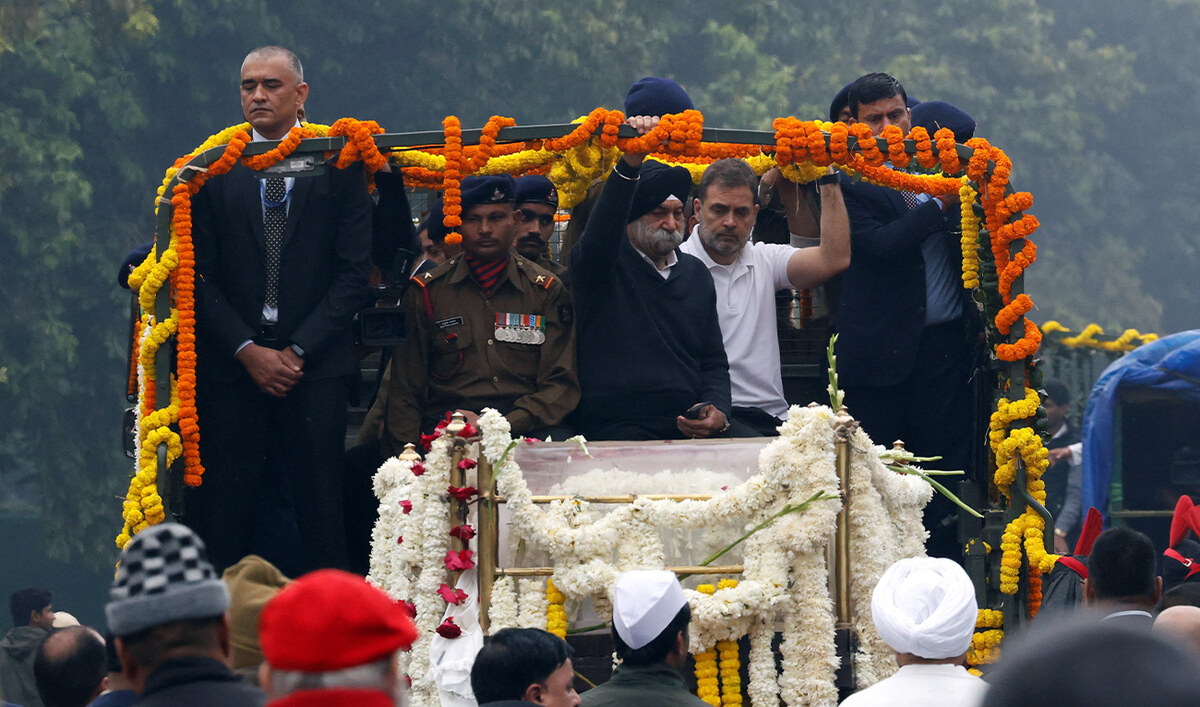MELBOURNE: Australia’s coronavirus hot spot state of Victoria on Sunday extended a hard lockdown in its capital Melbourne by two weeks to the end of September as infection rates have declined more slowly than hoped.
State Premier Daniel Andrews on Sunday extended the hard lockdown, in place since Aug. 2, to Sept. 28 with a slight relaxation, and mapped out a gradual easing of restrictions over the following two months.
Melbourne’s stage 4 restrictions, which had been due to end on Sept. 13, shut most of the economy, limited people’s movements to a 5-kilometer zone around their homes for one hour a day and imposed a night time curfew.
“We cannot open up at this time. If we were to we would lose control very quickly,” Andrews said at a televised media conference.
Victoria, Australia’s second most populous state, has been the epicenter of a second wave of the coronavirus, now accounting for about 75 percent of the country’s 26,282 cases and 90 percent of its 753 deaths.
The state on Sunday reported 63 new COVID-19 infections and five deaths, down from a peak of 725 new cases on Aug. 5.
Andrews said modelling showed cases would continue to average around 60 a day by next weekend, and if the state opened up too quickly it would be on track for a third wave by mid-November.
By contrast, Australia’s most populous state, New South Wales, has had no more than 13 cases a day since early August.
Andrews has resisted pressure to lift restrictions, which the federal government has blamed for dragging Australia deeper into its first recession in nearly 30 years, while other states have largely reopened their economies.
“You’ve got to defeat the second wave and do it properly. Otherwise you just begin a third wave. A third wave will mean we can’t do the economic repair that people desperately want us to do,” he said.
Starting from 11:59 p.m. on Sept. 13, some stage 4 restrictions will begin easing, with the nightly curfew starting at 9 p.m. instead of 8 p.m., people will be allowed outdoors for up to two hours instead of one, and those living alone will be allowed to have a visitor.
After Sept. 28, if average daily infection rates have dropped to between 30 and 50 for 14 days, child care, construction sites, manufacturing plants, and warehouses, will go back to normal, allowing 101,000 workers to return to their jobs.
Schools will also partially reopen and outdoor gatherings of up to five people would be allowed.
After Oct. 26, if daily infection rates have dropped below five over the previous two weeks, cafes and restaurants could reopen, mostly for outdoor service, and shops and hairdressers would reopen.
At the same time, the curfew would be lifted, there would be no limits on leaving home, outdoor gatherings could increase to 10, homes would be able to have five visitors, and some adult non-contact sports could resume.
After Nov. 23, cafes, bars and restaurants could have more people indoors, schools could reopen more fully, museums and other entertainment venues could reopen, public gatherings of up to 50 people would be allowed, and up to 20 visitors to homes.
“I know people are disappointed. I’m disappointed too that we cannot open up faster. But the key point here is to open and stay open,” Andrews said.
Restrictions in regional Victoria will ease from Sept. 13.
Australia’s COVID-19 epicenter extends hard lockdown
https://arab.news/wxuxb
Australia’s COVID-19 epicenter extends hard lockdown

- Gradual easing of restrictions over the following two months
- If state opened up too quickly it would be on track for a third wave by mid-November
Several airlines cancel flights to Russia after Azerbaijan Airlines crash

- Turkmenistan Airlines was the latest airline to announce cancelations Saturday
- Kazakhstan’s Qazaq Air has suspended its flights to Yekaterinburg until the end of January
Moscow has declined to comment on reports the plane could have been accidentally shot down by its air defense.
Russia has said that Grozny, the Chechen capital where the plane was meant to land, was being attacked by Ukrainian drones that day.
It crashed near the Kazakh city of Aktau Wednesday, killing 38 of the 67 people on board.
Turkmenistan Airlines — the national carrier of the reclusive Central Asian state — was the latest airline to announce cancelations Saturday.
It said that “regular flights between Ashgabat-Moscow-Ashgabat were canceled from 30/12/2024 to 31/01/2025,” without giving an explanation.
The decision came after UAE airline flydubai suspended flights between Dubai and the southern Russian cities of Mineralnye Vody and Sochi that were scheduled between December 27 and January 3.
Kazakhstan’s Qazaq Air has suspended its flights to Russia’s Urals city of Yekaterinburg until the end of January.
Earlier this week, Israeli airline El Al said it was suspending its flights to Moscow for a week.
The Azerbaijan Airlines Embraer 190 crashed near the western Kazakh city of Aktau, on the shores of the Caspian Sea.
It was carrying out a flight between Azerbaijan’s capital Baku and the city of Grozny in Russia.
For several days, some Western experts have been pointing to a crash caused by a Russian anti-aircraft missile.
Citing preliminary results of an investigation, Azerbaijan’s transport minister said Friday that the crash suffered physical “external interference.”
Statements from Azerbaijan citing the investigation into the incident suggest Baku believes the plane was hit mid-air.
On Friday, White House spokesman John Kirby said Washington has “indications” Russia may have been responsible, without giving details.
Cyber attack on Italy's Foreign Ministry, airports claimed by pro-Russian hacker group

- The pro-Russian hacker group Noname057(16) claimed the cyberattack on Telegram
MILAN: Hackers targeted around ten official websites in Italy on Saturday, including the websites of the Foreign Ministry and Milan’s two airports, putting them out of action temporarily, the country’s cybersecurity agency said.
The pro-Russian hacker group Noname057(16) claimed the cyberattack on Telegram, saying Italy’s “Russophobes get a well deserved cyber response.”
A spokesperson for Italy’s cybersecurity agency said it was plausible that the so-called “Distributed Denial of Service” (DDoS) attack could be linked to the pro-Russian group.
In such attacks, hackers attempt to flood a network with unusually high volumes of data traffic in order to paralyze it.
The spokesperson said the agency provided quick assistance to the institutions and firms targeted and that the attack’s impact was “mitigated” in less than two hours.
The cyberattack has not caused any disruptions to flights at Milan’s Linate and Malpensa airports, a spokesperson for SEA, the company which manages them, said.
While the websites were inaccessible, the airports’ mobile apps continued to function, the SEA spokesperson added.
Finland moves tanker suspected of undersea cable damage closer to port

- BBaltic Sea nations have been on high alert after a string of outages of power cables, telecom links and gas pipelines since Russia invaded Ukraine in 2022
OSLO: Finnish authorities said on Saturday they are moving an impounded tanker closer to port after boarding the vessel carrying Russian oil earlier this week on suspicion it had damaged an undersea power line and four telecoms cables.
Baltic Sea nations have been on high alert after a string of outages of power cables, telecom links and gas pipelines since Russia invaded Ukraine in 2022, and NATO said on Friday it would boost its presence in the region.
The Cook Islands-registered ship, named by authorities as the Eagle S, was boarded on Thursday by a Finnish coast guard crew that took command and sailed the vessel to Finnish waters, a coast guard official said.
Finnish police believe the Eagle S may have caused the damage to undersea cables the previous day by dragging its anchor along the seabed.
“The police begin an operation to transfer the Eagle S tanker from the Gulf of Finland to Svartbeck, an inner anchorage near the port of Kilpilahti,” the Helsinki police department said in a statement on Saturday.
This would be a better place to carry out investigations, it added.
Finland’s customs service believes the ship is part of a “shadow fleet” of aging tankers being used to evade sanctions on the sale of Russian oil.
The Kremlin said on Friday Finland’s seizure of the ship was of little concern to it. In the past, Russia has denied involvement in any of the Baltic infrastructure incidents.
France asks Indonesia to transfer national on death row

- Indonesia has in recent weeks released half a dozen high-profile detainees
- French diplomats have acknowledged that talks were underway for the transfer of Serge Atlaoui
JAKARTA: France has sent Indonesia an official request for the transfer of a French death row inmate who has spent nearly 20 years in prison, an Indonesian minister said on Saturday.
Indonesia has in recent weeks released half a dozen high-profile detainees, including a Filipino mum on death row and the last five members of the so-called “Bali Nine” drug ring.
French diplomats have acknowledged that talks were underway for the transfer of Serge Atlaoui, a 61-year-old Frenchman arrested in 2005 at a drugs factory outside the capital Jakarta.
The Indonesian government has now confirmed it received the official transfer request, which will be discussed in early January.
“We have received a formal letter requesting the transfer of Serge Atlaoui,” senior law and human rights minister Yusril Ihza Mahendra said.
The French embassy in Jakarta declined AFP’s request for comment.
Father-of-four Atlaoui has maintained his innocence, claiming that he was installing machinery in what he thought was an acrylics plant.
He was initially sentenced to life in prison, but the Supreme Court in 2007 increased the sentence to death on appeal.
Atlaoui was held on the island of Nusakambangan in Central Java, known as Indonesia’s “Alcatraz,” following the death sentence, but he was transferred to the city of Tangerang, west of Jakarta, in 2015 ahead of his appeal.
That year, he was due to be executed alongside eight other drug offenders but won a temporary reprieve after Paris stepped up pressure, with Indonesian authorities agreeing to let an outstanding appeal run its course.
In the appeal, Atlaoui’s lawyers argued that then-president Joko Widodo did not properly consider his case as he rejected Atlaoui’s plea for clemency — typically a death row convict’s last chance to avoid the firing squad.
The court, however, upheld its previous decision that it did not have the jurisdiction to hear a challenge over the clemency plea.
Atlaoui’s lawyer, Richard Sedillot, said last month that there was still “considerable hope” for a transfer.
Together Against the Death Penalty (ECPM) said the official request is the “penultimate step in a long fight” for those at the Paris-based organization who have campaigned for years to prevent Atlaoui’s execution.
“We are now waiting for this transfer to become a reality,” ECPM director Raphael Chenuil-Hazan said.
Earlier this month, Filipino inmate Mary Jane Veloso tearfully reunited with her family after nearly 15 years on Indonesia’s death row. She was transferred to a women’s prison in Manila where she awaits a hoped-for pardon for her drugs conviction.
Indonesia has some of the world’s toughest drug laws and has executed foreigners in the past.
At least 530 people were on death row in the Southeast Asian nation, mostly for drug-related crimes, according to data from rights group KontraS, citing official figures.
According to Indonesia’s Immigration and Corrections Ministry, more than 90 foreigners were on death row, all on drug charges, as of early November.
Despite ongoing negotiations for prisoner transfers, the Indonesian government recently signaled that it would resume executions — on hiatus since 2016 — of drug convicts on death row.
India’s former PM Manmohan Singh cremated with state honors

- Singh’s body, draped in Indian flag, was carried through the capital on a flower-decked carriage pulled by a ceremonial army truck
- Modi, who called Singh one of the nation’s ‘most distinguished leaders,’ attended the funeral, along with President Droupadi Murmu
NEW DELHI: The body of Manmohan Singh, the former Indian prime minister whose death has spark outpourings of grief at home and accolades from abroad, was cremated on Sunday on the banks of the Yamuna River in New Delhi with full state honors.
The funeral was conducted in the Sikh tradition as priests chanted hymns, after Singh’s body, draped in the Indian flag, was carried through the capital on a flower-decked carriage pulled by a ceremonial army truck.

The flag was removed and the body covered with a saffron cloth before it was placed on the pyre.
Since Singh died on Thursday at 92, many have taken up his comment near the end of his 10-year rule that “history will be kinder to me than the contemporary media.”
He was referring to a perception of weak leadership as he headed a coalition government facing numerous charges of corruption, which was thrown out of office in the 2014 election won by his successor Narendra Modi.
Modi, who called Singh one of the nation’s “most distinguished leaders” after his death, attended the funeral, along with President Droupadi Murmu and representatives of various countries. Modi’s government has decided to allocate land for Singh’s memorial.

Singh, considered the architect of India’s economic liberalization, had criticized Modi’s economic policies such as demonetization and introducing a goods and services tax.
Singh is survived by his wife and three daughters.

Congress Leader Rahul Gandhi accompanied Singh’s family on the truck to the Nigambodh Ghat cremation site after the procession from party headquarters in New Delhi, where people joined Congress party leaders and members to pay their last respects.
The leaders of the US, Canada, France, Sri Lanka, China and Pakistan were among those expressing grief at Singh’s death and highlighting his international contributions.


















